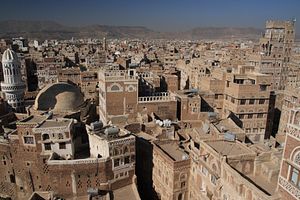Reports late last week in the Wall Street Journal and elsewhere suggested that Pakistan, given its close ties to Saudi Arabia, was considering its involvement in the Saudi-led campaign against the Houthi rebels in Yemen. Last week, Saudi Arabia, on the request of ousted Yemeni President Abd Rabbuh Mansur Hadi, initiated air strikes and a naval blockade against the Iran-backed Shia Houthi rebels who had captured the Yemeni capital of Sana’a earlier this year. The Yemeni government claimed that the Houthis were planning to overthrow the government and create a Shia state in Yemen while the Houthis see themselves as combating religious intolerance from the government.
Pakistan, a Sunni-majority Islamic state, maintains close defense and strategic ties with the Kingdom of Saudi Arabia. Last week, after the air strikes began, Saudi Arabia’s state media reported that Pakistan was one of the Muslim countries outside of the Middle East that was considering providing material support. Among Muslim countries, Pakistan is perhaps the most capable militarily. With an active nuclear weapons program and a large military — primarily to counter its greatest perceived threat from neighboring India — Pakistan is an important provider of military training and arms to Saudi Arabia’s armed forces.
Additionally, Riyadh has been a major source of financial assistance for the fiscally fragile Pakistani government. According to Reuters, last year, Pakistan received $1.5 billion in aid from Saudi Arabia to meet debt obligations and bolster its foreign exchange reserves. Given these factors, Pakistan’s involvement in a Saudi-led military campaign is far from unthinkable. Indeed, in 1990, Pakistan agreed to join an international force to defend Saudi Arabia from Iraqi aggression — Pakistani troops protected Saudi holy sites at the time.
“Pakistan enjoys close and brotherly relations with Saudi Arabia and other GCC [Gulf Cooperation Council] countries and attachés great importance to their security,” noted a statement that came out of Pakistani Prime Minister Nawaz Sharif’s office. Sharif reportedly met for several hours with senior Pakistani military personnel last week, including the Chief of Staff of the Pakistan Army, General Raheel Sharif (no relation), who recently traveled to Saudi Arabia for a high-level visit focused on military cooperation between the two countries. “The meeting concluded that any threat to Saudi Arabia’s territorial integrity would evoke a strong response from Pakistan,” the prime minister’s statement added.
However, over the weekend, the Pakistani foreign office noted that “rumors” of Pakistani military participation in the ongoing military campaign against the Houthis in Yemen were just that. “These are several reports in the media which are completely baseless,” Foreign Secretary Aizaz Chaudhary told the press on Saturday evening, according to Pakistan’s Geo news agency. He did note that a senior Pakistani delegation is heading to Riyadh to discuss possible options, but the country hasn’t conclusively determined the extent of its military participation in the Saudi-led campaign.
Khawaja Asif, Pakistan’s defense minister, made it clear that no Pakistani combat troops were currently in Saudi Arabia. “We have made no decision to participate in this war. We didn’t make any promise. We have not promised any military support to the Saudi-led coalition in Yemen,” Asif said. He noted, hearkening back to Pakistan’s involvement in Saudi Arabia in 1990, that Pakistan would only step in if Saudi Arabia’s territorial integrity was threatened.
Variables outside the bilateral Saudi-Pakistani relationship could affect Islamabad’s calculus. On Sunday, the League of Arab States announced that they would form a joint military force to counter the Houthi insurgency in Yemen and more generally combat the spread of Iranian influence across the region. Broader regional support for the Saudi initiative may make it more likely that Pakistani will participate in the conflict in the future.
Within Pakistan, Imran Khan, a prominent opposition politician who led widely destabilizing anti-government protests for the greater part of 2014, cautioned against Pakistan’s involvement in the conflict. Sharif’s government faces widespread criticism domestically for Pakistan’s ailing infrastructure and internal security situation and involvement in a far-flung foreign conflict could lead to a bad situation getting worse for his government. “Given our close ties to both Saudi Arabia and Iran and our own internal sectarian terrorism, Pakistan simply cannot afford to get embroiled in any Shia-Sunni conflict in the Gulf and Middle East regions. Pakistan must stay strictly neutral,” a lawmaker with Khan’s Tehreek-e-Insaaf party told the WSJ.
So far, the extent of Pakistan’s involvement in Yemen since Saudi air strikes began has been focused on rescuing Pakistani citizens in the country. The government evacuated 500 Pakistan nationals from Yemen after strikes began with the use of the national airline. One Pakistani frigate was also reported to have assisted in the rescue operation.

































